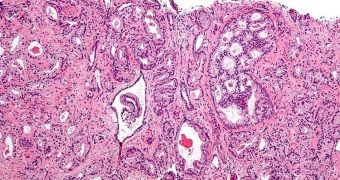The Mike Gooley Trailfinders Charity and the Prostate Cancer Charity have just awarded a £100,000 ($159,000, €115,000) grant to researchers at the University of Bristol, for the development of a method to destroy prostate cancer tumors by starving them of blood.
The main beneficiary of the research grant is UB School for Physiology and Pharmacology professor David Bates. He will now embark on a 3-year quest to establish whether drugs can indeed be used to cut off blood circulation at only specific locations in the body.
If this research is successful, the team will not have developed a treatment for prostate cancer, but rather a way to stop the growth of tumors. When cancer advances, cells flake off the original tumors, and then go on to establish colonies in other parts of the body as well.
This process is called metastasis. The generalize spread of cancer is a death sentence, and so experts want to reduce the number of men who fall prey to this condition. According to official statistics, more than 37,000 men are diagnosed with prostate cancer annually, in the United Kingdom alone.
About 10,000 die as a result of the condition or associated complications. “We are delighted that the Mike Gooley Trailfinders Charity on behalf of the Prostate Cancer Charity has agreed to fund this prestigious PhD studentship for three years,” Bates explains.
“Studentships provide vital training and help graduates to build their careers in prostate cancer research. The training and development of new young scientists in the field is crucial to advance prostate cancer research and continue its successful progress for the future,” he adds.
Throughout the study, the team will focus on identifying and analyzing molecules that control blood vessel growth inside the prostate tumors themselves. Researchers then hope to be able to develop ways of controlling the actions of such molecules for the benefit of the patients.
Obtaining such an ability will benefit men in the advanced stages of the condition especially. Slowing the spread of cancer could equal many years of life for these individuals.
“It is our hope that this study will help us make important strides in helping to stop the spread of the disease in men. Medical research is vitally important if we are to stop men dying of prostate cancer and improve the lives of men living with the disease,” Prostate Cancer Charity research manager Dr. Kate Holmes explains.

 14 DAY TRIAL //
14 DAY TRIAL //